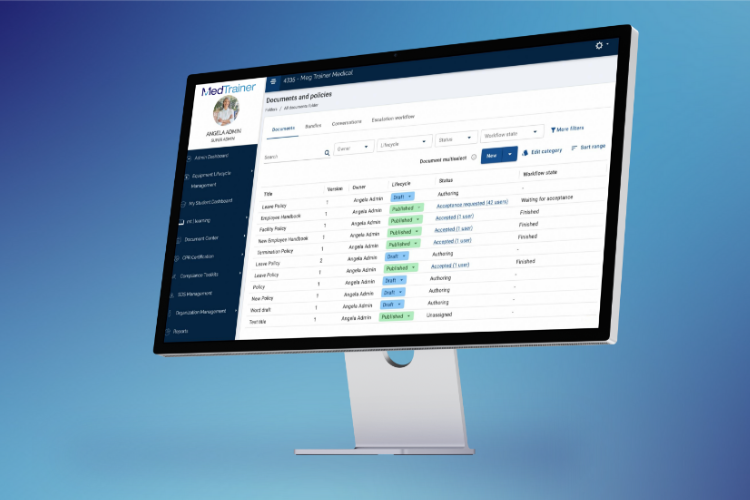Compliance is a top priority for any organization, but for healthcare especially. In fact, the concept of “compliance” reaches into all areas of operation — from compliance with HIPAA standards to alignment with workplace safety standards, and even compliance with labor regulations. To stay up-to-date on trends and set themselves apart, compliance professionals turn to the Compliance Certification Board (CCB) to earn professional designations and maintain the highest standards in the compliance field.
What Is the Compliance Certification Board (CCB)?
Part of the Society of Corporate Compliance and Ethics (SCCE), the Compliance Certification Board (CCB) determines competence in the practice of compliance and ethics. The primary function of the CCB is to set the standards for compliance certification, and to grant accreditation to hard-working individuals pursuing positions relevant to compliance or ethics oversight.
Areas covered by the Compliance Certification Board include ethics, risk management, audits and monitoring, investigations, and program management — all with a mind for best practices and ethical considerations. These areas are critical to the success of not only compliance professionals, but also the organizations that employ them.
Types of CCB Certifications
CCB certifications apply to occupations across all industries, and serve to recognize individuals who demonstrate expert knowledge of compliance standards and practices.
It’s important to note that individuals can become CCB certified; organizations cannot. For example, a healthcare organization can sponsor one of its employees as they pursue a certification; however, that certification applies to the person, not the organization.
According to CCB, as of 2024, “more than 11,400 people actively hold at least one of CCB’s compliance and ethics professional certifications.” CCB certification is a distinguishing feature on résumés and immediately marks that person as a quality-minded individual who approaches things from a best-practices standpoint.
The CCB offers the Certified Compliance & Ethics Professional (CCEP) certification, as well as these certifications in conjunction with the Health Care Compliance Association:
- Certified Compliance & Ethics Professional (CCEP)
- Certified in Healthcare Privacy Compliance (CHPC)
- Certified in Healthcare Research Compliance (CHRC)
- Certified in Healthcare Compliance Fellow (CHC-F)
As their names imply, these certifications focus on the core areas of healthcare compliance and distinguish professionals as experts when it comes to best practices, compliance frameworks, and ethical considerations. As a result, professionals certified in healthcare compliance are often prized additions to any healthcare facility’s staff.
How Do You Earn a CCB Certificate or Designation?
To earn CCB certification, professionals must meet requirements set by the CCB, which are dependent on the designation you’re pursuing.
The first step is rooted in practical education. For example, if you’re interested in becoming a Certified Compliance and Ethics Professional, you’d need to spend a year doing full-time compliance-related work, complete 1,500 hours of compliance-related tasks, or opt-out of the previous options by attending a CCB-accredited university and completing a certificate program there.
After education comes action. For a CCEP, you’d need to complete 20 continuing education units (CEUs) — which must be approved by the Compliance Certification Board — and submit proof of completion alongside an Examination Application. If accepted, you’ll need to schedule an examination with the CCB to prove your knowledge. If you pass, you’ll walk away with your CCEP!
Why Pursue CCB Accreditation?
The Compliance Certification Board is responsible for turning out specialists who will perform exceptionally in their chosen specialty. Through CCB examination and certification, individuals develop a true understanding of everything that their profession entails. As a result, these professionals are equipped to become stewards for better compliance and ethics within their workplace.
Many healthcare organizations prioritize hiring CCB accredited individuals — or even pay for their existing staff to go through CCB examination and certification. They see this as an investment in the continued excellence of their facilities, healthcare programs, and provider success. In many cases, CCB certification can pay for itself in the number of compliance pitfalls avoided as a result of having a knowledgeable team.
For healthcare professionals looking to get on a strong career path, CCB certification helps them stand out as leaders. In 2023, Healthcare Compliance Officers see an average salary of nearly $88,000 annually, with a pay scale that can rise as high as $150,000+ with experience. Often, success in this career path begins with CCB accreditation.
What Is the Purpose of the CCB?
The primary purpose of the CCB is to promote the highest standards of ethical and professional conduct in compliance and ethics, and to recognize individuals who have demonstrated expertise in these areas. However, the CCB doesn’t only stop at certification!
The CCB also offers educational resources, networking opportunities, and a community for compliance professionals to share best practices and discuss emerging issues in the field. Overall, the CCB plays an important role in promoting professionalism and excellence in compliance and ethics, and in advancing the field as a whole. This is particularly important for industries like healthcare, where standards and practices are always evolving.
As the healthcare industry changes, the CCB and those certified by it play an all-important role in ensuring healthcare organizations also evolve. The best practices of today may not be the best practices of tomorrow. Organizations that employ CCB certified staff are equipped to evolve to ensure they stay compliant.
Taking Healthcare Compliance To the Next Level
CCB certified healthcare compliance professionals are on the cutting edge of compliance, so they are also among the first to adopt new practices, such as compliance software. Adopting technology helps compliance professionals get more done in less time while also maintaining a high level of organization. MedTrainer is a critical resource for CHCs, CHCPs, CHRCs, and CHCFs. The all-in-one platform enables compliance oversight at-scale, and with the speed and accuracy necessary to stay on top of evolving best practices.

